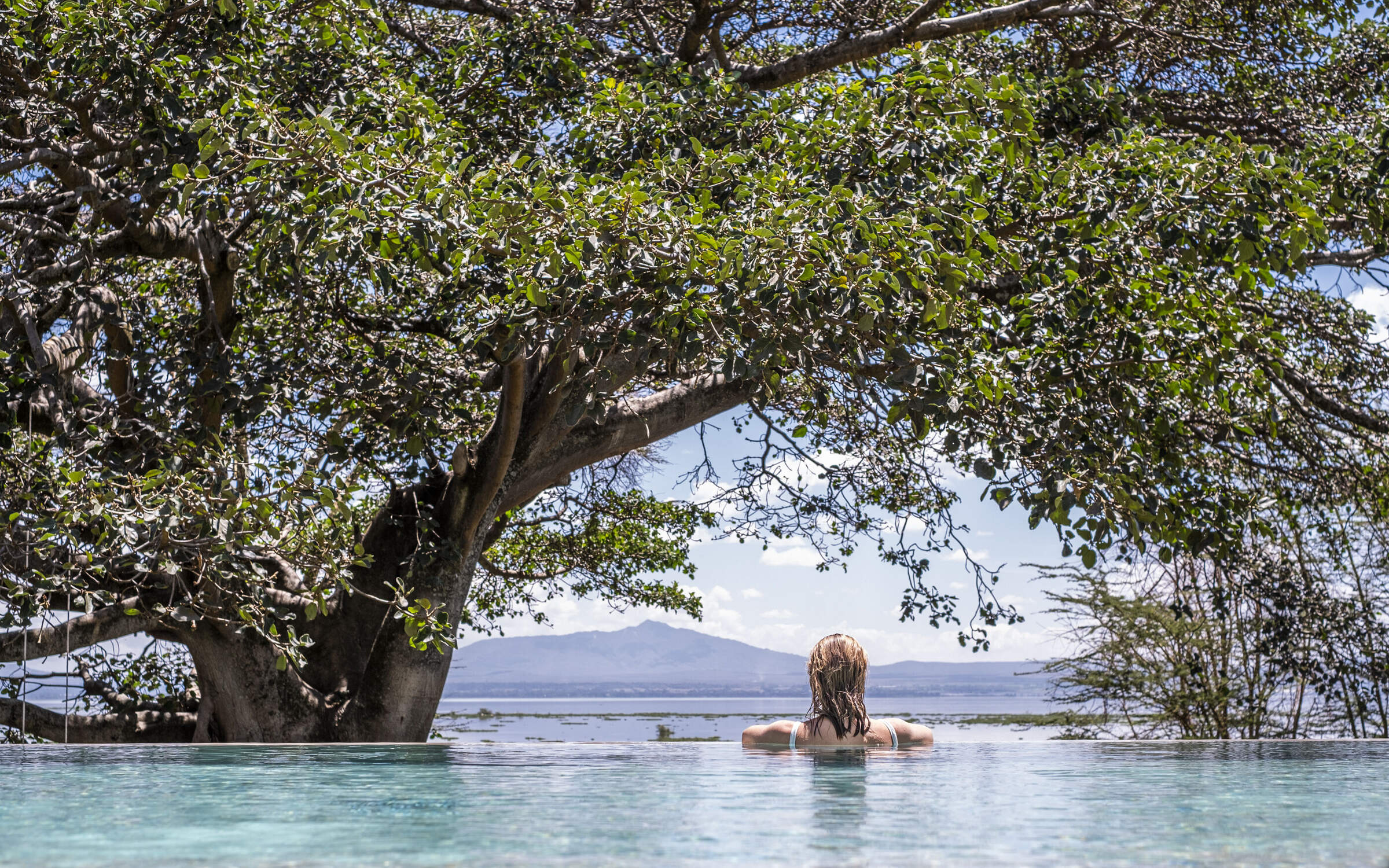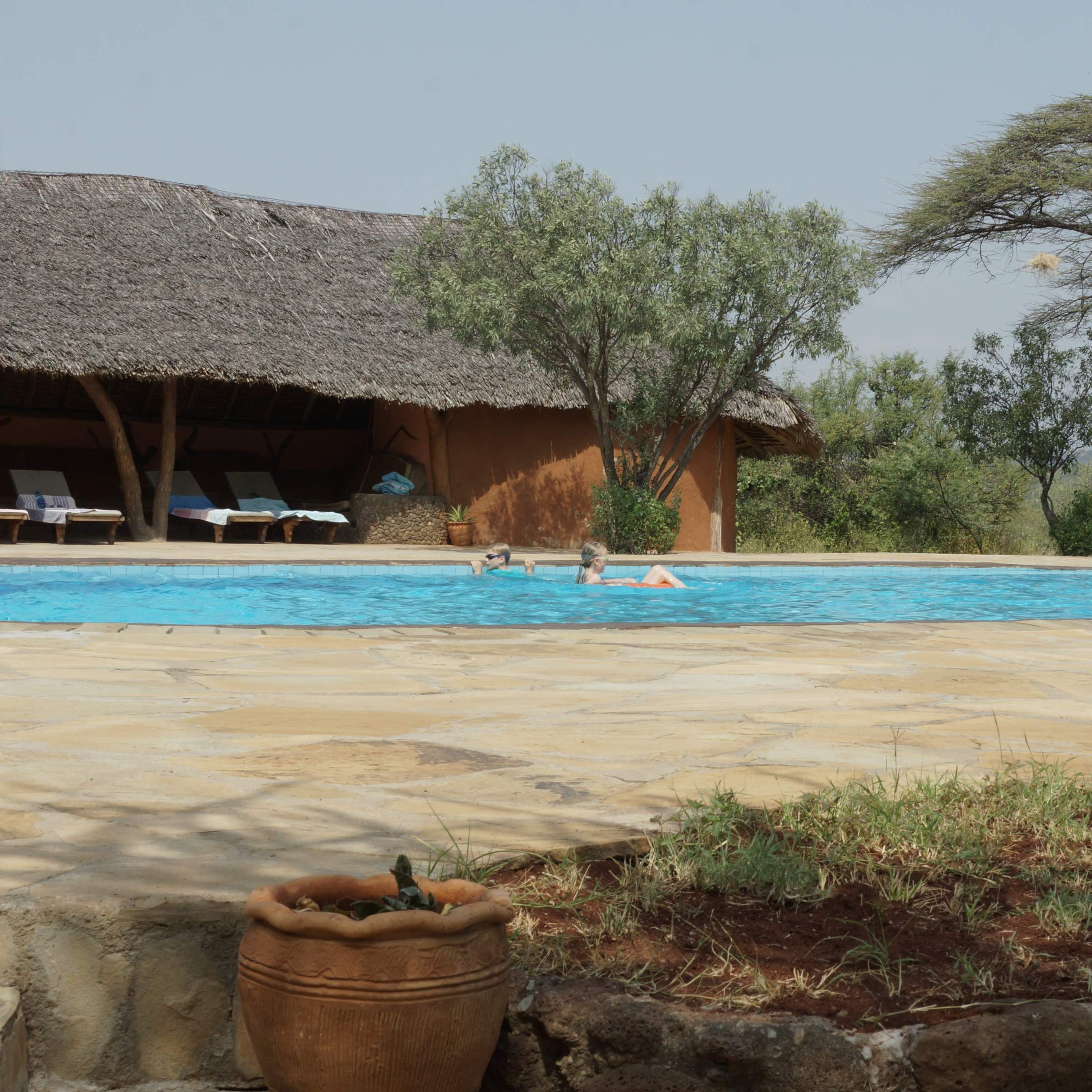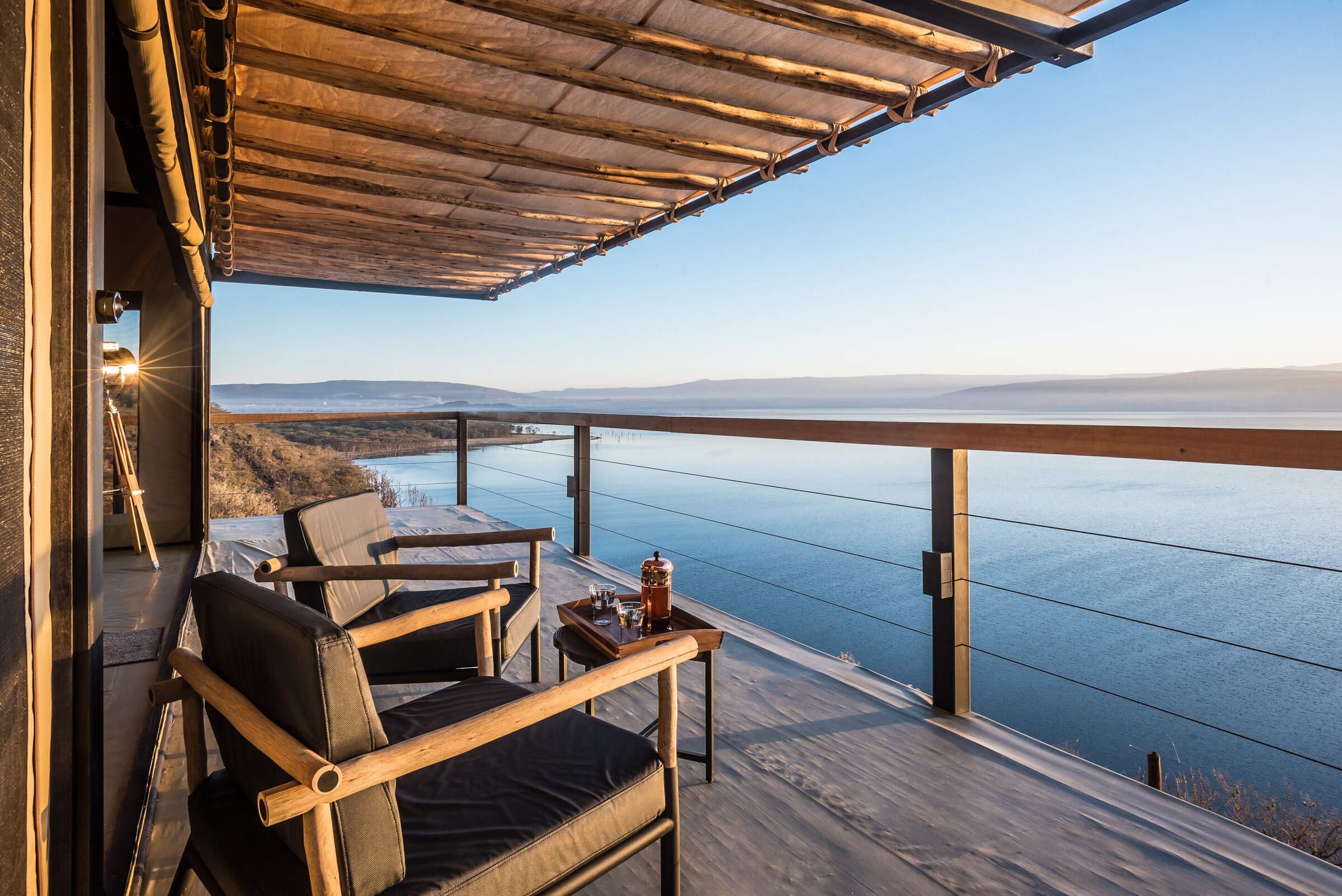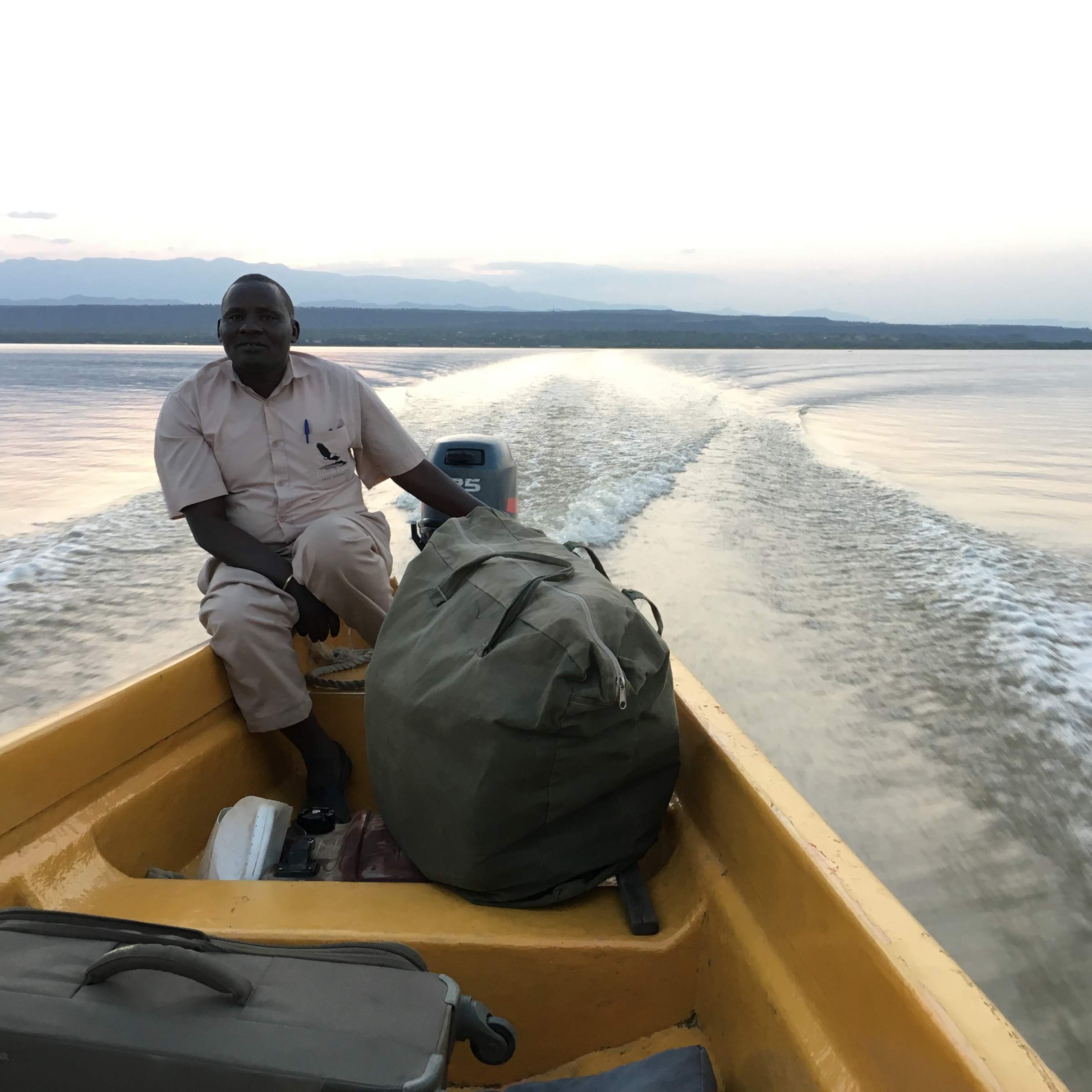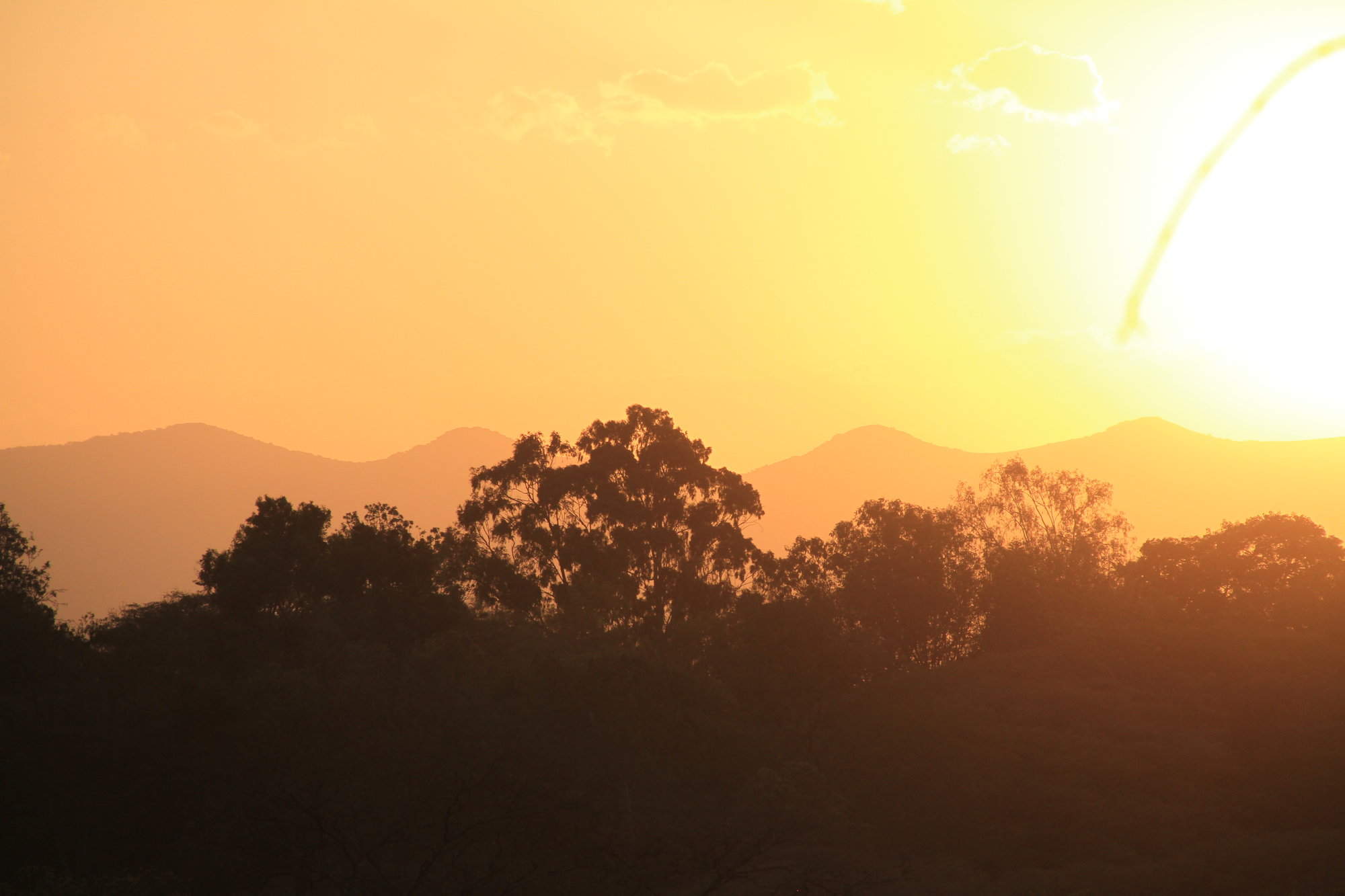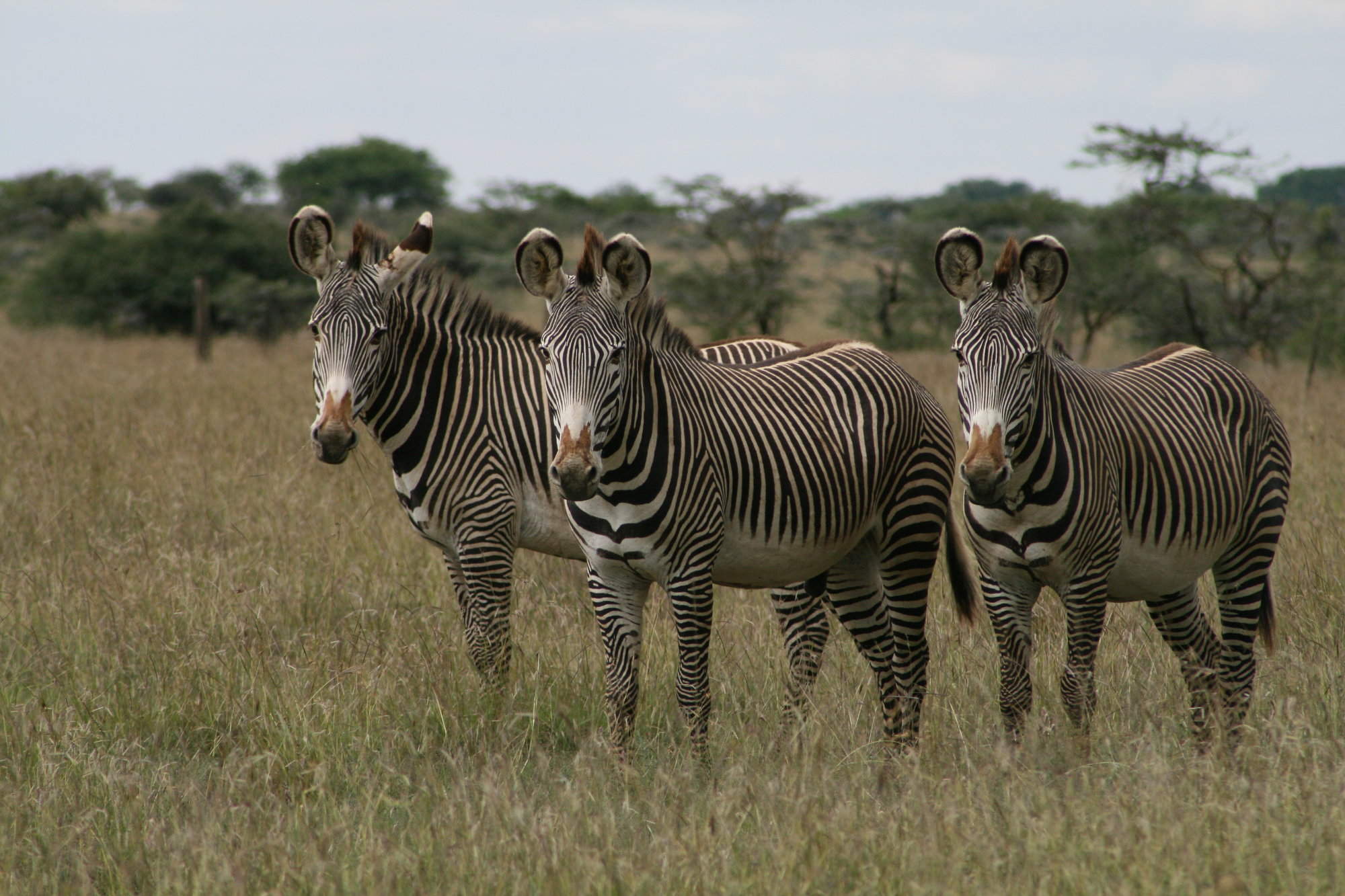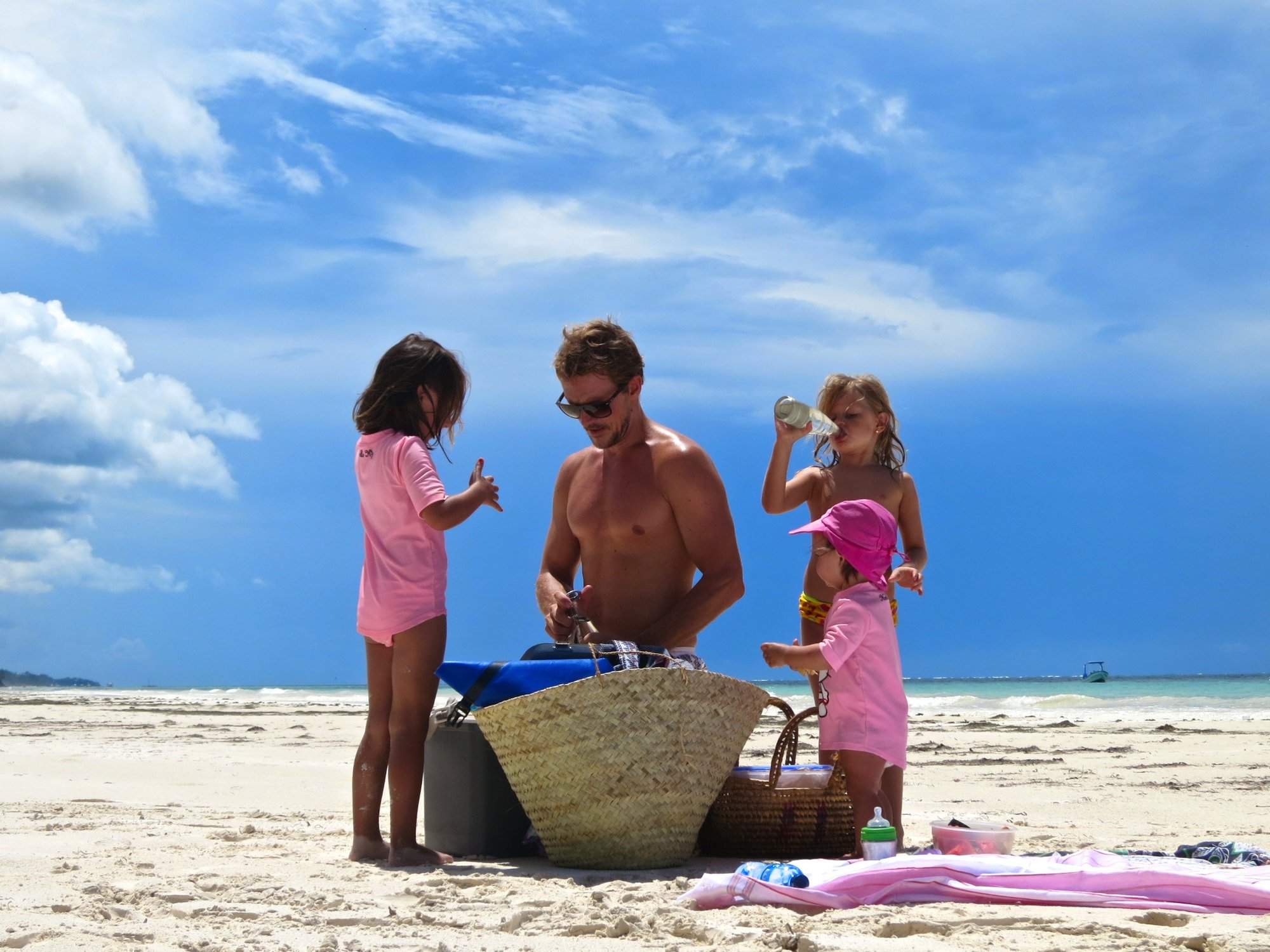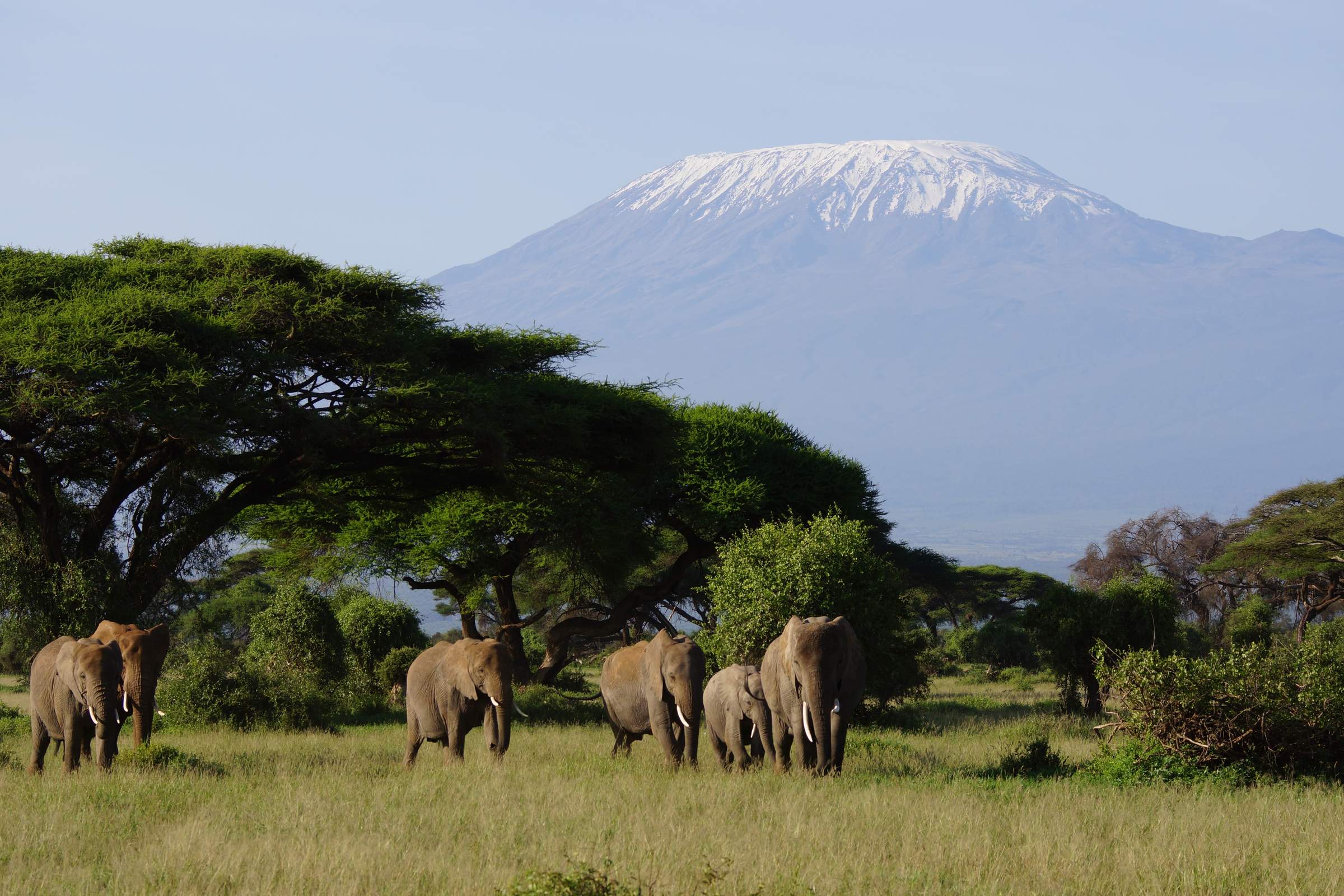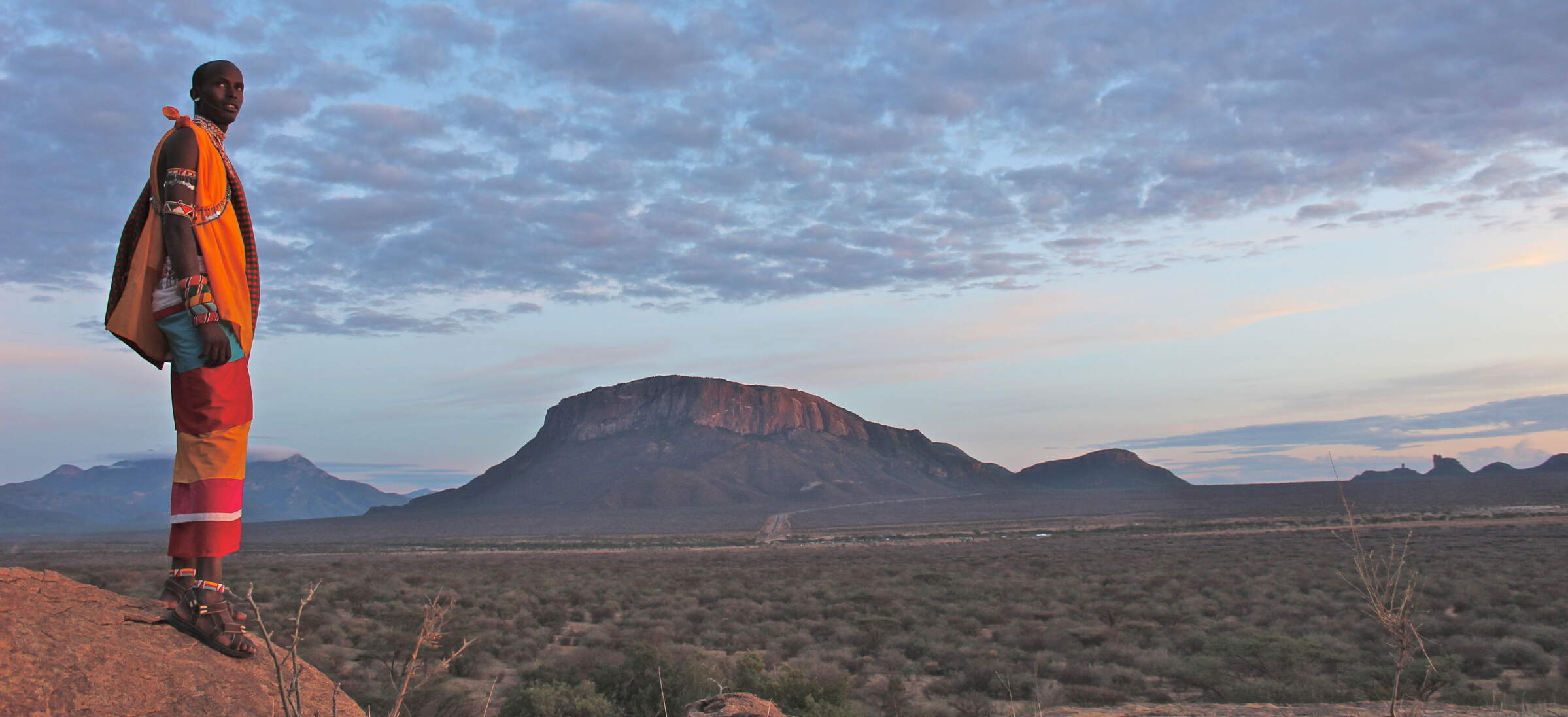Mbweha Camp: Our full report
Mbweha Camp is a small safari lodge on the privately owned Soysambu Conservancy, just outside Lake Nakuru ...
... National Park in the Rift Valley. It's well-placed for visiting this popular park and the neighbouring Soysambu Conservancy, with its flamingos and big cats.Most visitors will arrive by road, down the fast and wide 'Pipeline Road' from Nakuru town to the small rural crossroads community of Elmenteita. All these rolling plains between lakes Nakuru and Elmenteita, and further south to Lake Naivasha – traditionally the grazing lands of local Maasai clans – were acquired by Hugh Cholmondeley (known as Lord Delamere) in the early years of the twentieth century, a total of more than 600 square kilometres that allowed his family to become the richest landholder in Kenya at the time, and Delamere himself to become the unofficial voice of European settlers. Today, most locals work on and among the Delamere properties.
From Elmenteita village, you enter the western sector of the Soysambu conservancy (there's a gate) and drive 5km across the plains among scatterings of gazelle and zebra to a fringe of woodland marking the (fenced) boundary of Lake Nakuru National Park (you can often see colobus monkeys in the trees). Crossing the end of the grassy Congreve Airstrip, where warthog keep watch, you enter the unfenced Mbweha Camp (‘Jackal Camp’), marked by a garden of planted trees and natural, cactus-like euphorbias.
The central bar-lounge-reception is set in a slight depression, accessed by short steps, under a circular thatched roof. There's comfortable seating down here and a circular fireplace. The rather featureless dining area is nearby. Outside the dining room, lawns spread to the well-maintained swimming pool, which has shade and loungers, but no life guard.
The ten guest rooms at Mbweha Camp, each named after an animal, are circular, thatched bandas, built of lava stone, with polished, light cement floors. They have a small veranda area at the front. Inside, a double bed and single bed, with full-height mosquito nets, occupy most of the space, along with a small sofa and clothes storage shelves. The UK-style 3-pin sockets are available to charge from 6-9am, from 12.30-1.30pm and from 6-11pm. Behind the beds, a dividing wall separates the bedroom from the open-plan bathroom, which has a flush loo and a shower with plenty of hot water at good pressure, a rather impractical towel rack and a narrow wooden plinth for the twin, steel wash basins and single mixer tap. Good Cinnabar & Green toiletries are provided. Through a door to the side of the cottage, there's an incongruous-looking outdoor bathtub, screened by barely private fencing – unlikely to entice anyone to take a bath under the stars.
The night we spent at Mbweha Camp was comfortable; dinner and breakfast were very good; and all the facilities functioned as they should. But the muddled lack of any coherent design in the rooms' décor and furnishings was an unwelcome surprise at this level.
Activities
Activities at Mbweha include short bush walks around the camp and guided bike rides in the western (lion-free) part of the Soysambu Conservancy. The camp also offers massage (one hour massage US$35) on a portable table.Mbweha Camp has one open-sided Land Cruiser based at camp for shared game drives for guests staying on a full board and activities basis. The vehicle is equipped with charging sockets. Some guests will be staying on a full board basis, not including activities, with their drives conducted in a private vehicle by their own private driver-guide, as part of a road itinerary. The main options are game drives in Lake Nakuru National Park ($60 per person for non-resident adults) and Soysambu Conservancy ($47 per person for non-resident adults). Judgind by our short experience, we thought the guiding from Mbweha Camp was very good.
The Lake Nakuru National Park Nderit Gate is about 20 minutes' drive from camp: in less than half an hour you're game-driving in a very wildlife-rich environment, which also tends to mean it's usually very busy with visitors. While Lake Nakuru is no longer the preferred feeding ground for hundreds of thousands of lesser flamingos (as it was through much of the later part of the last century), as serious flooding changed the lake's ecology after 2012, the park is still home to some serious megafauna, and the plains and woods that surround the lake are home to lions, white rhinos, black rhinos, leopards, buffalo and plenty of plains grazers and browses, from zebras to hippos and from dik-diks to giraffes (they have the rare Rothschild giraffe here). There are no elephants here and it's worth knowing that the park is fenced.
The western part of Soysambu Conservancy, west of the Pipeline Road, is known as the Congreve Conservancy and this 25km² area is reckoned to free of dangerous wildlife and safe for walks and bike rides. East of Pipeline Road, you enter the much larger eastern part of the 190km² Soysambu Conservancy proper, which as well as providing grazing to the ranch's livestock, is home to lions, leopards and plenty of buffalo, though not elephants. Driving in, you pass some dilapidated Delamere staff housing, but as you approach Lake Elmenteita, the scene improves greatly, with the Eburru and Mau ranges on the southern horizon, the bulk of Menengai crater to the north, and the Aberdare range to the northeast. Guides will point out the hill formations known as the 'Sleeping Warrior' and 'Delamere's Nose'. You have a very good chance of seeing some of Soysambu's lions, which are breeding and gradually sorting into two or three separate prides, numbering a total of at least 14 cats. Down near the shore of Lake Elmenteita, you'll see lesser flamingos in their thousands, standing in the foam-flecked shallows of this soda lake – though not in the numbers you can witness at Lake Bogoria. On our visit in 2018 we saw a leopard lurking in the bush near the lakeshore and briefly followed it - but this was an unusual bit of luck.
Our view
Nobody from Expert Africa had visited Mbweha Camp until 2018, but we frequently book its very popular sister camp, Elephant Bedroom, in Samburu National Reserve. So we were slightly disappointed to find Mbweha much in need of redecoration and a complete soft refurb in the rooms. The location and basic infrastructure of the camp are fine, however, and we found the staff uniformly helpful and professional. Our morning game drive in Soysambu Conserancy was rewarding and well conducted. The food was good, too. We'll look forward to revisiting and finding the rooms looking much better in the future.
Geographics
- Location
- Rift Valley, Kenya
- Ideal length of stay
- 3-4 nights
- Directions
- Mbweha Camp is located at the western end of the Soysambu Conservancy, part of the privately owned Delamere Estate. The nearest airstrip is Congreve Airstrip, just two minutes from camp, which normally only receives private charter flights. The nearest airstrip for scheduled flights is Loldia Airstrip at Lake Naivasha, about 1 hour's drive away. Nakuru town, and the main A104 highway across the Rift Valley are about 30 minutes drive to the north. The southeastern Nderit Gate of Lake Nakuru National Park is about 20 minutes drive from camp.
- Accessible by
- Fly-and-Transfer
Food & drink
- Usual board basis
- Full Board & Activities
- Food quality
- The food at Mbweha is surprisingly good. We were there for dinner and breakfast. Dinner offers a choice of two or three starters, three or four main courses including something vegetarian, and two desserts. You're expected to make your choices in the lounge at around 6pm, or when you return from your afternoon game drive, and also to let them know when you'd like to eat (7-9pm). Our frosty cold beers were followed by potage andalous (minestrone soup), a paneer stew with rice and a member of the cheesecake family for dessert. They have a reasonably long wine list, mostly South African, and mostly priced around the Ksh3,000 (US$30) mark. Breakfast was fresh and crisp and quickly served, with excellent coffee.
- Dining style
- Individual Tables
- Dining locations
- Indoor and Outdoor Dining
- Further dining info, including room service
- We found the dining room rather lacking in atmosphere. There is no charge for room service.
- Drinks included
- Drinks are not included, but are reasonably priced.
Children
- Attitude towards children
- Children are welcome.
- Property’s age restrictions
- None.
- Special activities & services
- None, though the pool will appeal to children.
- Equipment
- Baby cots and high chairs are available.
- Notes
- Mbweha isn't a particularly child-friendly camp, and as it is unfenced, children will need to be mature, or under constant supervision.
Communications
- Power supply notes
- Solar panels provide 75% of requirements with a generator providing the balance. Charging in your room can be done from 6-9am, from 12.30-1.30pm and from 6-11pm. The rooms have 24/7 lighting.
- Communications
- The camp Wi-fi is a little weak, apparently best in the low season when fewer people are using it. Mobile signals are reasonable good from most providers.
- TV & radio
- There is no guest TV at Mbweha Camp but staff have a TV in their canteen where guests would be welcome to watch major sporting events etc.
- Water supply
- Borehole
- Water supply notes
- Drinking water is decanted from large bottles.
Health & safety
- Malarial protection recommended
- Yes
- Medical care
- There are two first-aid kits in camp and three staff are first-aid trained. There is a doctor on the Soysambu Conservancy and Nakuru town is a 20-minute (fast) drive away.
- Dangerous animals
- Moderate Risk
- Security measures
- There are several askaris and at night guests are escorted around this unfenced camp. Buffalos are a potential threat in camp, so guests need to be alert.
- Fire safety
- There's a fire extinguisher at every room and four around the lounge and dining room. Fire-training is done twice a year.
Activities
4WD Safari
Birdwatching
Boat trip
Guided walking safari
Private activities
Extras
- Disabled access
- On Request
- Laundry facilities
- Laundry can be done at extra cost, though underwear is not included.
- Money
- There is an office safe, but no safes in the rooms.
- Accepted payment on location
- Credit cards (MasterCard, Visa and Amex) are accepted without a surcharge. Most major currencies are accepted in cash at the prevailing rate of exchange.
Other lodges in Rift Valley
Alternative places to stay in this same area.







